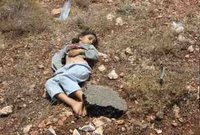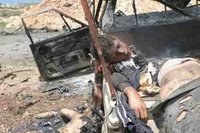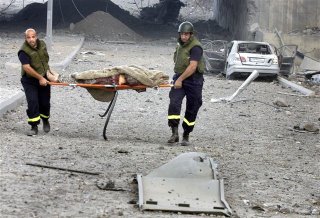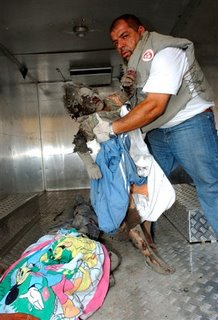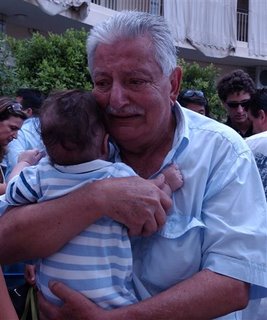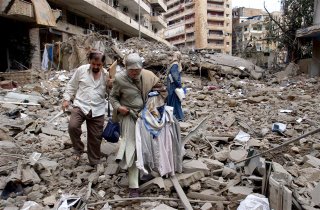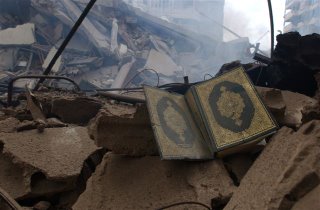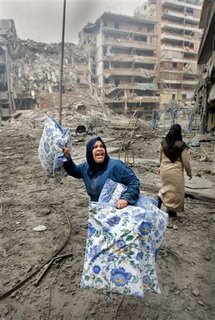21-7-2006
Here's the latest , sorry for being late today:
From the AP:-Thousands of Lebanese civilians fled north on Friday after Israel warnedthem to leave border villages and called up 3,000 army reserves in apossible prelude to a major ground offensive against Hizbollah guerrillas - The siege on Lebanon is not letting humanitarian aid in,"said Hisham Hassan, spokesman for the International Committee of the RedCross (ICRC). "The south is isolated." Two ICRC trucks were on their way from Beirut to a hospital in Tyre, where staff began burying corpses temporarily in a massgrave dug in an army barracks to clear space in the morgue-
(Reuters) - Some of the world's major aidagencies said on Friday that British Prime Minister Tony Blair had got his policy on the crisis in Lebanon "horribly wrong" byfailing to call for an immediate ceasefire in the Middle East. Blair's stance has put his country at odds with the rest ofthe international community, seven agencies, including Christian Aid, Save the Children and Oxfam, said in a joint statement. "The situation on the ground is grim and getting worse,"said Janet Symes, Christian Aid's regional manager for theMiddle East.
GENEVA (AP) _ The first international Red Cross reliefconvoy to reach the besieged southern Lebanese city of Tyrearrived on Friday after a six-hour journey over war-damagedroads from Beirut, a spokesman said. The convoy's arrival indicated a new Israeli willingnessto allow the international community to respond thedeteriorating humanitarian situation in Lebanon following aweek of Israeli-Hezbollah fighting, said Vincent Lusser, spokesman of the International Committee of the Red Cross. it's the first response we've had to our request forbetter humanitarian access,¯ he said. Two trucks in the convoy brought 24 tons of food, medical supplies and other assistance to the port city in the relief effort coordinated with Israeli authorities, Lussersaid.
The country has been becoming more isolated because ofdamage to roads, bridges and other structures. Because of the destruction and the danger of being hit,people have been afraid to go out and relief has beendifficult to provide, U.N. and other officials said. The availability of safe water, sanitation and hygiene is vital for people affected by the emergency, UNICEF said.The U.N. children's agency said a third of people killedand an estimated half of those displaced were children. UNICEF will be delivering vital supplies of water kits, purification tablets, water containers and essential drugsover the weekend and says its immediate funding needs areUS$7.3 million (د5.8 million).
The World Health Organization said it was very concerned about the lack of electricity in hospitals, safe passage ofambulances and access to people in the south of thecountry. The exact situation and needs of the estimated 500,000people displaced or otherwise affected by the conflict was difficult to assess because humanitarian agencies werefinding it difficult to move around the country, saidElisabeth Byrs, spokeswoman for the U.N. Office for theCoordination of Humanitarian Affairs, or OCHA. Although supplies were stockpiled to be sent to Lebanon,moving them was delayed because roads and bridges weredamaged or destroyed by Israeli air raids and shelling inthe southern part of the country, said officials of the United Nations and the ICRC. Even when trucks and ambulances could, they risked beinghit, ICRC officials said.
The initial convoy has enough supplies to care for 4,000people, said Lusser, adding that the agency hopes to follow with more aid. The U.N. refugee agency said it, too, is trying to getguarantees of safe passage from the warring sides. It is vital that there are safe corridors for" relief effort coordinated with Israeli authorities, Lussersaid.
The country has been becoming more isolated because ofdamage to roads, bridges and other structures. Because of the destruction and the danger of being hit,people have been afraid to go out and relief has beendifficult to provide, U.N. and other officials said.
The availability of safe water, sanitation and hygiene is vital for people affected by the emergency, UNICEF said.The U.N. children's agency said a third of people killedand an estimated half of those displaced were children. UNICEF will be delivering vital supplies of water kits, purification tablets, water containers and essential drugsover the weekend and says its immediate funding needs areUS$7.3 million (د5.8 million).
The World Health Organization said it was very concerned about the lack of electricity in hospitals, safe passage ofambulances and access to people in the south of thecountry.
The exact situation and needs of the estimated 500,000people displaced or otherwise affected by the conflict was difficult to assess because humanitarian agencies werefinding it difficult to move around the country, saidElisabeth Byrs, spokeswoman for the U.N. Office for theCoordination of Humanitarian Affairs, or OCHA.
Although supplies were stockpiled to be sent to Lebanon,moving them was delayed because roads and bridges weredamaged or destroyed by Israeli air raids and shelling inthe southern part of the country, said officials of the United Nations and the ICRC.
Even when trucks and ambulances could, they risked beinghit, ICRC officials said.
The initial convoy has enough supplies to care for 4,000people, said Lusser, adding that the agency hopes to follow with more aid.
The U.N. refugee agency said it, too, is trying to getguarantees of safe passage from the warring sides. It is vital that there are safe corridors for
humanitarian aid to reach those in need, but we have no guarantees yet of safe passage to the mountain regions,¯said Ron Redmond, chief spokesman of the U.N. HighCommissioner for Refugees. "We are ready to release tonsof supplies, including shelter materials, from our emergency stockpiles in Jordan and Syria as soon as safetransport routes are worked out." Redmond said a UNHCR emergency team was assembling inDamascus, Syria, preparing to head to Beirut to reinforce the agency's staff and check on the needs of "tens ofthousands of displaced people who have fled to mountain valleys outside Beirut for safety." The needs of these people, particularly those living in communal buildings such as schools, will become critical ifthey don't get assistance," he added. French Foreign Minister Philippe Douste-Blazy told a newsconference in Beirut that France was dispatching urgent aid to Lebanon by air and sea. He, too, called for safepassage.
The U.N. Relief and Works Agency, which cares forPalestinians in Lebanon and elsewhere in the Middle East,said its main concern was the food supply for nearly 3,000 displaced people staying in 40 shelters it has set up inits clinics and schools. " The economic situation is worsening day by day" saidUNWRA spokesman Matthias Burchard. "Provisions are runningout." He told reporters that the prices of vegetables had goneup 400 percent in east Beirut as a result of thehostilities. UNICEF was to fly tons of health kits, sanitation suppliesand toys from its warehouse in Copenhagen, Denmark, this\nweekend to Damascus for road shipment to Lebanon.
In Geneva, UNICEF spokeswoman Wivina Belmonte saidchildren were bearing the brunt of the hostilities."They make up one third of the fatalities so far,"Belmonte said. Of the hundreds of thousands of internallydisplaced people, our estimates are that half of those are" humanitarian aid to reach those in need, but we have no guarantees yet of safe passage to the mountain regions,¯said Ron Redmond, chief spokesman of the U.N. HighCommissioner for Refugees. "We are ready to release tonsof supplies, including shelter materials, from our emergency stockpiles in Jordan and Syria as soon as safetransport routes are worked out." Redmond said a UNHCR emergency team was assembling inDamascus, Syria, preparing to head to Beirut to reinforce the agency's staff and check on the needs of "tens ofthousands of displaced people who have fled to mountainvalleys outside Beirut for safety" The needs of these people, particularly those living in communal buildings such as schools, will become critical ifthey don't get assistance," he added. French Foreign Minister Philippe Douste-Blazy told a newsconference in Beirut that France was dispatching urgent aid to Lebanon by air and sea. He, too, called for safepassage. The U.N. Relief and Works Agency, which cares forPalestinians in Lebanon and elsewhere in the Middle East,said its main concern was the food supply for nearly 3,000 displaced people staying in 40 shelters it has set up inits clinics and schools. ®The economic situation is worsening day by day,¯ saidUNWRA spokesman Matthias Burchard. ®Provisions are runningout.¯ He told reporters that the prices of vegetables had goneup 400 percent in east Beirut as a result of thehostilities.
UNICEF was to fly tons of health kits, sanitation suppliesand toys from its warehouse in Copenhagen, Denmark, this weekend to Damascus for road shipment to Lebanon.
In Geneva, UNICEF spokeswoman Wivina Belmonte saidchildren were bearing the brunt of the hostilities. "They make up one third of the fatalities so far,¯ Belmonte said. "Of the hundreds of thousands of internallydisplaced people, our estimates are that half of those are
children. She said the recreational kits being sent were notfrivolous. We're talking about kids that have suffered from scars that have been inflicted over the last few days that arelikely to last a generation. Finding some way to find somekind of normalcy in a completely abnormal situation isanother one of our priorities.
---------------------------
Associated Press reporter Sam Cage in Geneva contributedto this report.


